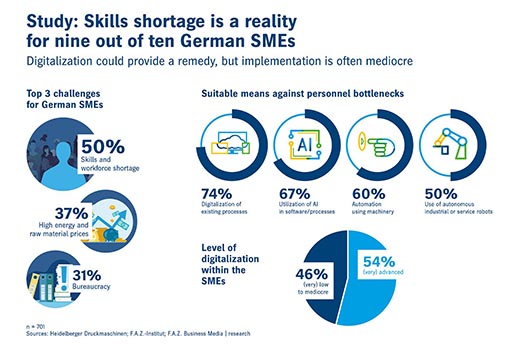Study Shows Skills Shortage Is a Reality for Nine Out of Ten German SMEs
Press release from the issuing company

- Challenge: A widespread problem that extends beyond the printing industry
- Catching up to do: Almost half of SMEs only moderate when it comes to digitalization
- Solution: Artificial intelligence, machinery, and robotics offer potential remedies
German SMEs are suffering a massive skills and workforce shortage – a fact highlighted by a representative survey among SME decision-makers that the F.A.Z. Institute conducted for Heidelberger Druckmaschinen AG (HEIDELBERG). According to this survey, nine out of ten German SMEs do not have enough staff. Just under half (49 percent) said they were badly or very badly affected by the skills and workforce shortage. “Our customers in the printing industry have been facing a skills and workforce shortage for years. HEIDELBERG therefore wanted to know whether this is a general trend among German SMEs. Our solutions for combating staff shortages at print shops are automation and digitalization, which make jobs more technical and also mean these jobs appeal to a larger number of potential recruits. This strategy can serve as an example for SMEs from other sectors,” says HEIDELBERG CEO Dr. Ludwin Monz.
Using the latest machines, print shops can work fully automatically in both packaging production and commercial printing. The entire process is digitalized. Robotics systems complement the presses, meaning that print shops can manage with fewer prepress and postpress staff as well. For example, the new coexisting StackStar C robot works directly alongside people and relieves them. “All German SMEs need a strategy that enables them to compensate for staff shortages using state-of-the-art technologies, and yet the survey shows that many small and medium-sized enterprises still have some catching up to do in terms of digitalization,” continues Monz.
According to the study, almost half of SMEs rate their own companies as no better than moderate when it comes to digitalization. At the same time, however, making greater use of technology is a good way for many SMEs to compensate for staff shortages. Three-quarters of respondents (74 percent) are looking to the digitalization of their work processes as a remedy. Two-thirds (67 percent) regard the use of artificial intelligence (AI) in software and their own processes as an effective means of minimizing staff shortages at their company. Industrial SMEs in particular see opportunities in the further automation of their production. Some 67 percent of respondents from the manufacturing sector feel machine- based automation is a good way of tackling the skills and workforce shortage, while 58 percent of industrial SMEs think using industrial and service robots is a good idea.
“The German economy still has a lot to do when it comes to digitalization, and that goes beyond individual companies,” says Monz. Seven out of ten respondents rate the digitalization of Germany’s economy as no better than moderate. Only just under a third consider it to be advanced or very advanced.
Digitalization and automation as key locational factors
Germany requires digital and automated processes to remain a successful major industrial location in the future. Some 91 percent of the SMEs responding to the survey agreed that Germany’s economy is not competitive without digitalization and automation.
The issues ranked highest by SMEs when asked about the most pressing problems at the present time were the skills and workforce shortage (50 percent), high energy and raw material prices (37 percent), and bureaucracy (31 percent).
- Questions to ask about inkjet for corrugated packaging
- Can Chinese OEMs challenge Western manufacturers?
- The #1 Question When Selling Inkjet
- Integrator perspective on Konica Minolta printheads
- Surfing the Waves of Inkjet
- Kyocera Nixka talks inkjet integration trends
- B2B Customer Tours
- Keeping Inkjet Tickled Pink
© 2024 WhatTheyThink. All Rights Reserved.















Discussion
Only verified members can comment.